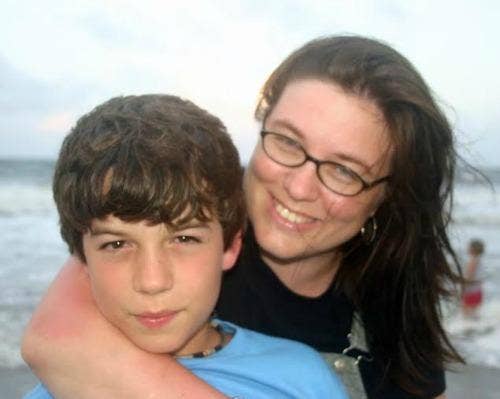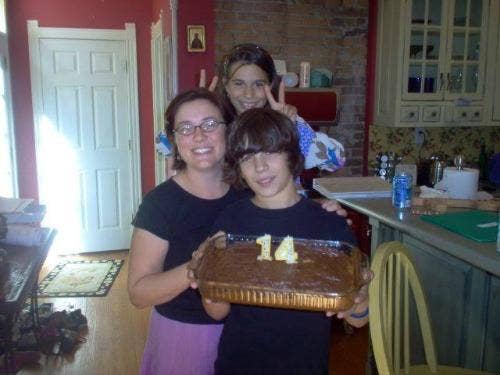I was obviously pleased to have found myself with this naturally upbeat disposition. After seeing what depression did to my father, it scared the hell out of me. I wanted nothing to do with it. And then, in 2010, my oldest child, Henry, died. Not only did he die, but he suffered terribly for 31 days in the hospital before his father and I had to make a decision that still gives me regular nightmares: we had to decide to remove life support. I was with him when he took his last breath. RELATED: 5 New Alternative Ways To Treat Depression Without Meds No parent should ever find herself in a tiny room with only a curtain for a door, holding her beloved baby as he struggles to breathe without the mechanical support that had been sustaining him, waiting for him to finally lay quiet. But I was the parent who lived through that. And at that moment, in that tiny hospital cubicle, something snapped inside of me. Something shifted, and the seeds of the depression took root. After Henry’s death, there was more trauma. Struggles with law enforcement to try to get the drug dealers who encouraged Henry to take the deadly dose arrested (I finally did). Struggles with the medical examiner to have all of Henry’s remains released to us (it took four years). Struggles with certain media to end their inaccurate and biased reporting (It never stopped). RELATED: The Real Reason I Divorced My Depressed Husband It was a constant struggle, and as a result, I re-experienced Henry’s actual death again and again. It came to me in my waking hours and when I tried to sleep, which I mostly couldn’t do for years. Can you say PTSD?
Photo: Author Throughout this time I was attempting to work full-time at my job, which I loved, and probably kept me sane and functioning far longer than I would have been able to otherwise. But all the time, the depression I dreaded was growing. I fought it. I denied it. I pretended that I was the same sunny, energetic person that I was before, but the depression was stronger than any good intentions I had. It didn’t help that the trauma I’d experienced also seemed to trigger several physical ailments that I’d never experienced in my life. I developed a rather debilitating case of Hashimoto’s Thyroiditis, an autoimmune thyroid disease that sapped my energy in a way I never imagined possible. Suddenly, dragging myself out of bed and to work became a daily struggle. My work suffered, and that made me feel even worse. I finally listened to all those around me who told me I needed to see a therapist. My standard line about seeing a therapist was that unless that person could make Henry not be dead, there really wasn’t anything he or she could do for me. But I knew I was sinking. I knew I needed help. And so I went. My therapist saw that I wasn’t sleeping or eating, that I was having daily nightmares, and was increasingly unable to function. He immediately sent me to a psychiatrist. The first psychiatrist I saw wasn’t helpful at all. She had me in tears by the end of my first visit with her. She also prescribed medication that I was willing to try, but by the end of the first week I could tell was only making me worse. It was at this time that I decided I could no longer do my job. Leaving the job I loved so dearly was one of the hardest decisions I’ve ever made. But I was simply in no position to work. Increasingly, I was bed-bound. I wasn’t getting any better; I was getting much worse. Only my very closest family and friends knew just how sick I was. I was mortified to have morphed from this hyperconfident girl-on-the-rise with a happy and satisfying family and professional life, to this deeply depressed, hopeless recluse. Friends from work would ask me to lunch and I would come up with every excuse to avoid having to face them. I knew that no one wanted the truth: that I had become terribly, terribly sick with depression and a heaping side dose of crippling anxiety. This state of affairs lasted for about a year. I spent a year completely non-functional, bursting into tears repeatedly at the thought of my son, feeling hopeless and helpless, and like there was no way back to the person I was before the depression descended on me. Thank God I had my husband, sister, and my mother-in-law to pick up the slack with caring for my children, who had become used to hearing, “Mommy just isn’t feeling well today.” Our family also strongly felt the loss of my income. Our financial situation suffered significantly while I was unable to contribute. Finally, the day came when I knew I needed to be hospitalized. This was my bottom. I never imagined I would end up a person who needed to be hospitalized for depression. This decision was made with my newer doctor. I didn’t know it yet, but this doctor and going to the hospital were the beginning of the sun coming back out for me. I certainly couldn’t see it at the time, but this was the turning point. As I sat sobbing in my hospital bed, afraid that people would find out where I was and what was going on, my doctor assured me that for the first time, I was in a place where my only job was to let go of worrying about what people would think of me and concentrate fully on getting well. He started me on two new medications that began helping almost immediately, and he also recommended that I undergo a procedure that isn’t used as often as it used to be, but that he thought would work for my treatment-resistant depression: electroconvulsive therapy, otherwise known as ECT. Like many people, my only “experience” with ECT had been watching the violent electrocution of Jack Nicholson in One Flew Over the Cuckoo’s Nest. But my doctor, whom I’d grown to trust because he was helping me to improve, assured me that today’s ECT procedures are gentle, performed under general anesthesia, and almost miraculously effective for the hardest to treat depressions. I was desperate, hurting, and wanting more than anything to get back to my life. So I agreed. I had a series of five ECT treatments and they were indeed just as gentle an experience as my doctor had assured me they would be. My husband Jon was with me at all times, and within days I was feeling better enough that I was ready to go home. RELATED: 9 Subtle Signs Of Depression I Was Too Depressed To Notice Combined with the new medications that my doctor had prescribed, the ECT worked. After two years of abject hell, I was on my way to recovery.
Photo: Author Today, I’m well — radiantly well. I take my medication every day without fail, I see my doctor regularly, and I know that if I need them, ECT “top-up” treatments are an option. But I haven’t needed them. My freelance consulting business is thriving and I’m beginning the search for full-time employment. I’m a whole mother again. I’m a friend who’s there for my loved ones. Life is good, something I never could have imagined on those days when depression lied to me and told me I would never have my life back. But like anyone who has experienced a bout of extreme depression, the darkness sits just over my shoulder, watching me, flirting with me whenever given the chance. But I know that when depression makes an attempt to do an end-run around all the things I do to keep it at bay, I have the support system and tools to push back and say “No, I will NOT go back to that place.” I know that Henry would never want me back in that place. Not even all my family members realized just how sick I was. But it’s important for those of us who have been to the brink and back to share our experiences openly and remove the stigma that I felt so keenly. It would have been so easier if I could have told people what I was going through when I was going through it. Diabetes patients don’t hide. Cancer patients don’t hide. It’s time for those of us who have experienced depression to step out of the shadows. Katie Allison Granju is the mother of five children ranging in age from toddler to teenager. Follow her on Twitter. This article was originally published at averysmallhouse.blogspot.com. Reprinted with permission from the author.

